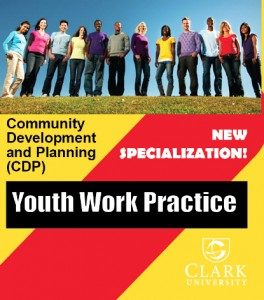 In a world where racism, sexism, and homophobia exist, it is important for young people to have access to role models they can trust and respect—individuals who can help them develop knowledge, skills, and a sense of purpose. Clark University is now helping to train those leaders by offering a Professional Certificate in Youth Work Practice.
In a world where racism, sexism, and homophobia exist, it is important for young people to have access to role models they can trust and respect—individuals who can help them develop knowledge, skills, and a sense of purpose. Clark University is now helping to train those leaders by offering a Professional Certificate in Youth Work Practice.
“Whether leading a youth development organization, managing youth programs, or working at the frontlines with young people, youth workers put the well-being of young people at the center of their efforts,” said Laurie Ross, associate professor of Community Development and Planning at Clark and director of the certificate program. “Most of the time, youth workers have to learn how to do this on their feet. There are very few opportunities for professional education for this field.”
Clark’s certificate program, the only one of its kind in the area, will combine theory, dialogue, reflection, and practice to ensure that students are effective with young people and have the administrative skills to demonstrate their impact.
“One of the most exciting aspects of this program is that it was co-created with local youth workers,” said professor Ross. “We essentially created the type of academic program they were looking for.”
Clark’s program is designed for both current master’s degree students at Clark as well as practicing youth workers from the Greater Worcester area and beyond. The program consists of six core courses as well as learning, teaching and action in the context of a Community of Practice (CoP) that includes Clark faculty directly engaged in youth work along with aspiring, novice, and experienced youth workers. Individuals who pursue the certificate will learn to:
- identify and analyze community forces that positively and negatively affect young people and how to apply this analysis to youth work;
- appraise and respond to complex and ambiguous youth work problems and to think and act on one’s feet;
- involve young people in their own analysis of oppressive systems;
- develop, run, manage, evaluate, and fund theoretically grounded youth development programs and organizations; and
- network with other youth development professionals and share resources.
Students can select from a wide array of courses offered by Clark’s International Development, Community, and Environment (IDCE) Department, as well as other departments at Clark. Courses include youth and community development, public communication, non-profit management, and grant writing. Faculty from seven departments are involved in this specialization; all are directly engaged in some form of youth work practice or research.
Ross said the courses in the program, like all courses at Clark under Liberal Education and Effective Practice (LEEP), are designed to encourage reflection, empowerment, and development of a professional collective identity. Students in the program can also get involved in several ongoing research projects Clark faculty are conducting with our community partners aimed at helping vulnerable youth in the city of Worcester.
For more information on the Youth Work Certification Program, visit https://www.clarku.edu/graduate-admissions/contact/program-contacts.cfm.


